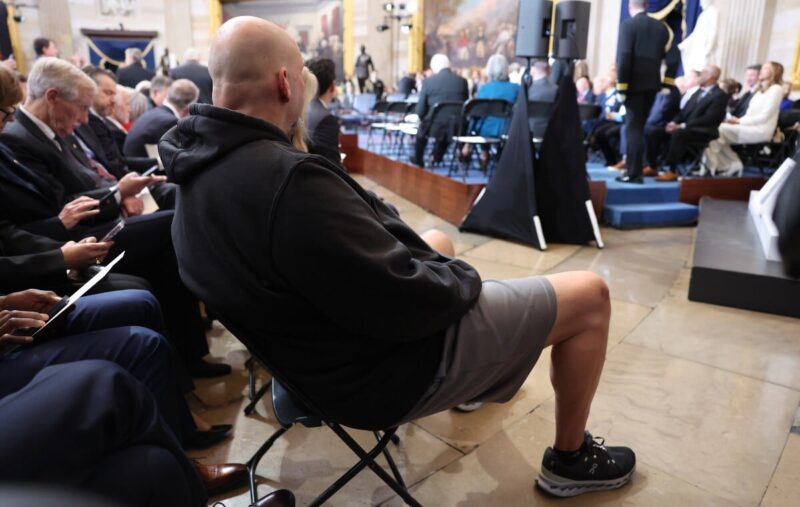For the better part of this year, task 2025 has been a catchall among Democrats for the threat erstwhile president Donald Trump poses to American society. The more than 900-page Mandate for Leadership, crafted by conservative think tank the Heritage Foundation, is simply a sprawling and frequently contradictory mix of ideas from more than 100 organizations. It’s tied together not by unified policy predictions but by a series of preoccupations: China; “wokeness”; climate denialism; and a commitment to gutting or abolishing national agencies. It includes plans that would remake America’s approach to technology, but like many things in the document, its authors can’t precisely agree on how.
Trump has attempted to distance himself from the policy plan, but it’s tied to him by many threads. His moving mate, JD Vance, is friends with Kevin Roberts, the president of the Heritage Foundation, and Vance even wrote the introduction to Roberts’ forthcoming book, Dawn’s Early Light. (The book’s publication, initially slated for September, was postponed until after the election.) And any of task 2025’s chapters were written by Trump’s own erstwhile administration officials, including FCC commissioner Brendan Carr and Department of Homeland safety authoritative Ken Cuccinelli.
If Trump is elected, it’s highly likely that any of task 2025’s ideas would be implemented — we just don’t know which ones. The most provocative proposals, like banning pornography, are prominently highlighted but never explained. Authors, in turn, urge fighting and embracing tech companies. “I don’t think I’ve encountered a single individual in America who agrees with 100 percent,” Roberts said at the Reboot Conference in San Francisco in September. “It’s like the menu at the Cheesecake Factory.”
Much of what’s on the menu is notably little delicious. We’re not going to break down all part of task 2025 here — you can find more general guides at CBS News, which showed how many of task 2025’s policy recommendations match Trump’s own; ProPublica, which obtained secret training videos created for task 2025’s Presidential Administration Academy; and The New York Times, which interviewed respective erstwhile Trump officials active in the creation of task 2025. Instead, we’re taking a look at how its recommendations would affect tech at all level, from how companies can hire abroad workers to the social media platforms we usage all day.
Though there are any contradictions between and within chapters — signs of fissures or points of contention among the dozens of participating organizations — task 2025 does, in the end, amount to a coherent vision. The paper calls for a extremist expansion of government power to punish conservatives’ enemies in tech, oust possible dissenters within the national bureaucracy, and enforce right-wing want list items like mass deportations and a national abortion ban. All of this would be combined with mass deregulation and the defunding of social services and national agencies that contribute to the public welfare. task 2025’s authors want tiny government for social goods — but large government for retribution.
Federal Trade Commission
Authored by: Adam Candeub, a prof. of law at Michigan State University. Candeub served as the acting assistant secretary of commerce for telecommunications and information under Trump. From 2020 to 2021, he was the deputy associate lawyer general in Trump’s Department of Justice.
Project 2025’s FTC guidelines are possibly the clearest example of conservative ambivalence toward tech. The section doesn’t actually offer a set of policy proposals. Instead, it outlines 2 diametrically opposed approaches: 1 where the Trump administration fiercely enforces antitrust law to break up monopolies; and another where it does barely anything at all.
In the enforcement route, task 2025 suggests utilizing the FTC to rein in major corporations, especially large tech companies. It puts forward the European Union’s “less friendly regulatory environment” as a good model, possibly referring to EU laws like the Digital Markets Act, which have forced tech companies to make major hardware and software changes to their products. It encourages the FTC to partner with state attorneys general to scrutinize or block hospital, supermarket, and large tech mergers. And it recommends that the FTC look into whether social media platforms’ advertising to and contract-making with children constitute unfair trade practices.
While there’s overlap with Democratic antitrust priorities here, there’s besides a focus on clearly partisan concerns. The chapter suggests investigating whether social media platforms censored political speech in collusion with the government, following up on probes by the Republican-led home of Representatives and Republican state attorneys general. (Hunter Biden’s laptop, unsurprisingly, gets a mention.) You’ll besides see references to issues like the “de-banking” of controversial figures, which the Trump household has cited as an inspiration for its mysterious crypto platform. “We are witnessing in today’s markets the usage of economical power — frequently marketplace and possibly even monopoly power — to undermine democratic institutions and civilian society,” the chapter claims.
Each of these points is contradicted by a long-standing conservative counterpoint: the government should let the marketplace regulate itself. If the FTC regulates how children usage net platforms, for example, it could undermine conservatives’ calls for “parental empowerment on education or vaccines.” Expanding cooperation between the FTC and state attorneys general could “tie mediate America to large progressive government.”
Ultimately, though, the chapter seems to favour intervention. Conservatives “cannot unilaterally disarm and neglect to usage the power of government to further a conservative agenda,” it warns, even if their goal is to do distant with the regulatory state.
Federal Communications Commission
Authored by: Brendan Carr, a associate of the national Communications Commission who was appointed by Trump in 2017.
Much of this chapter focuses on “reining in” major tech companies. Carr proposes a host of policies, including eliminating certain immunities under Section 230 of the Communications Decency Act and “clarifying” that Section 230’s key 26 words should only be utilized in cases about platforms failing to remove illegal material posted by users, not as a broader shield for moderation decisions.
Carr’s real concern is with social media platforms’ alleged suppression of conservative speech. The chapter suggests requiring “Big Tech” to follow net neutrality-like rules akin to those for broadband providers, like disclosure on practices specified as blocking and prioritizing content. Platforms should besides be required to “offer a transparent appeals process” erstwhile user content is taken down.
The chapter besides suggests that the FCC regulatory power should be expanded with “fundamental Section 230 reforms” that let it regulate how online platforms average content — or, in Carr’s words, “no longer have carte blanche to censor protected speech.” Carr describes Texas’ HB 20 — the law that forbids platforms from removing, demonetizing, or downlinking posts based on “viewpoint,” which set the phase for NetChoice v. Paxton — as a possible model for national legislation.
As companies must halt “censoring” conservative speech, they’re expected to restrict children from accessing certain social media platforms. Carr rapidly notes that these views “are not shared uniformly by all conservatives,” but as is the case in another chapters, the notion of expanding government powers to punish right-wing opponents ends up winning out over a more laissez-faire approach.
Congress should besides require large tech to pay into the FCC’s Universal Service Fund, which helps fund broadband access in agrarian communities and is presently funded by broadband providers. It’s another example of task 2025’s movement distant from Reagan-era “small government” conservatives in favour of punishing disfavored targets with more regulation.
The chapter besides recommends that the FCC and White home work together to free additional airwaves for commercial wireless services and mostly do more to “move spectrum into the commercial marketplace.” Carr besides recommends that the government build out net infrastructure on federally owned land. The latter, however, can’t be accomplished by the FCC alone, and Carr notes that it would require working with the Bureau of Land Management and the Forest Service, among another agencies. The chapter besides recommends that the FCC more rapidly review and approve applications to launch fresh satellites, specifically for the purposes of supporting StarLink, Kuiper, and akin efforts.
And then there’s China. 1 of the primary recommendations is that the FCC “address TikTok’s threat to national security.” (Congress has, since the time the Mandate for Leadership was published, done just that by attempting to ban the app unless it divests from its parent company, ByteDance; whether the courts will let that happen remains to be seen.) Others include creating a more regular process to review entities “with ties to the CCP’s surveillance state” and stopping US entities “from indirectly contributing to China’s AI goals.”
Financial regulatory agencies
Authored by: David R. Burton, a elder investigation fellow in economical policy at the Heritage Foundation; and Robert Bowes, a elder advisor to the assistant secretary of the Department of Housing and Urban improvement under Trump and erstwhile advisor to Trump aide Stephen Miller.
While another sections are frequently ambivalent about government regulation, this chapter straightforwardly suggests giving major concessions to cryptocurrency and loosening restrictions on who can invest in private companies.
Anyone who’s been following Trump’s attempts to court the crypto community should know what’s coming here. There are a host of recommendations for the Securities and Exchange Commission, which the authors say has “chosen regulation by enforcement” for cryptocurrency. The biggest change would be redefining digital assets as commodities, alternatively of securities, so they’re no longer regulated by the SEC.
The chapter besides recommends making private capital raising little restrictive by changing a regulation known as Regulation D. Under Regulation D, companies can rise unlimited funds for securities from an unlimited number of “accredited investors,” with no disclosure needed to the SEC. “Accredited investors” must presently have a wage of $200,000 (or $300,000 combined with their spouse) or a net worth of at least $1 million, excluding their primary residence. As of 2022, more than 24 million American households met these requirements. task 2025 recommends broadening these qualifications or eliminating them altogether.
In practice, this would let anyone invest in any private company, not just — as the regulation stands present — companies on the public market. To go public, companies gotta meet certain requirements and file a registration message with the SEC, where they’re subject to reporting requirements. In exchange, they presently get access to a much broader pool of possible investors. Eliminating the accredited investor request would effectively let companies to skirt the requirements of going public — and the oversight they’re subject to afterward.
Department of Commerce
Authored by: Thomas F. Gilman, the manager of ACLJ Action, a conservative organization affiliated with the American Center for Law and Justice. Gilman was the chief financial officer and assistant secretary for administration of the US Department of Commerce under Trump.
This sprawling chapter touches on nearly all major task 2025 theme, from fears of China to the “alarm industry” of national climate monitoring. Like practically all another section, it recommends expanding the national government’s scope if it will advance conservative interests and doing distant with any agencies that don’t.
In keeping with the goal of dismantling national bureaucracies, this chapter suggests doing distant with the National Oceanic and Atmospheric Administration (NOAA), which it says should be privatized or placed under the control of states and territories. another agencies, like the National Weather Service (NWS) and Office of Oceanic and Atmospheric Research, would be severely downsized. (In a message provided to the Los Angeles Times, Steven R. Smith, the CEO of AccuWeather — which task 2025 suggested could replace the NWS — said AccuWeather’s forecast engine partially relies on NOAA data.) These agencies supply the data utilized in weather forecasts accessed by millions of Americans each day and besides give the public crucial information about impending hurricanes, heatwaves, and another natural disasters and utmost weather events.
The Republican libertarian wing may get its goal of privatizing national agencies, but most of this chapter argues for more — not little — government interference in the market. Noting that China has made crucial advances in semiconductor design, aerospace technologies, and another crucial industries, it recommends fresh rules to prevent tech transfer to abroad adversaries. It besides suggests an executive order expanding the Export Control improvement Act of 2018 to restrict exports of Americans’ data. And it opposes intellectual property waivers for “cutting-edge technologies” like covid-19 vaccines — which an earlier chapter says the Centers for illness Control and Prevention shouldn’t encourage people to get — through global agreements. These waivers, which were hotly debated for years following the onset of the pandemic, give low- and middle-income countries access to life-saving immunizations, though advocates say more needs to be done to accomplish global vaccine equity.
The chapter besides suggests adding certain app providers — including WeChat, TikTok, and TikTok’s parent company, ByteDance — to the entity list, which would prevent the apps from issuing program updates in the US, effectively making them nonoperational. The Heritage Foundation seemingly didn’t get the memo that Trump loves TikTok now.
Department of Transportation
Authored by: Diana Furchtgott-Roth, manager of the Heritage Foundation’s Center for Energy, Climate, and Environment.
Unlike another chapters that are openly antagonistic toward tech companies, this chapter suggests partnering with the private sector to “revolutionize travel.” There’s an emphasis on private transportation over public transportation — not just in terms of opposing government backing for mass transit but besides supporting ridehailing apps, self-driving vehicles, and micromobility, which only gets a passing mention in the chapter but likely refers to e-bikes and electrical scooters.
Current policies, the paper says, “strangle the improvement of fresh technologies” like drones. Instead, the DOT should encourage the usage of tiny aircraft for air taxis or for quiet vertical flights. It should besides push for a shift to digital or distant control towers for planes, letting flights be managed “anywhere from anywhere.”
Department of the Treasury
Authored by: William L. Walton, a trustee of the Heritage Foundation and the founder and chair of the private equity firm Rappahannock Ventures LLC; Stephen Moore, a visiting fellow in economics at the Heritage Foundation; and David R. Burton, a elder investigation fellow in economical policy at the Heritage Foundation.
Under task 2025, the US would effectively abandon its commitment to stopping climate change. The chapter suggests getting free of the department’s Climate Hub office and withdrawing from global climate change agreements, including the Paris agreement and the United Nations Framework Convention on Climate Change. alternatively of focusing on clean energy or climate change-resilient infrastructure, the chapter suggests that the government should invest in home energy, especially oil and gas.
Like respective another sections, this chapter takes aim at “wokeness” and diversity, equity, and inclusion (DEI) programs. As part of task 2025’s plan to gut the national workforce, it suggests identifying all Treasury officials who have participated in DEI initiatives, publishing their communications about DEI, and firing anyone who participated in DEI initiatives “without objecting on constitutional or moral grounds.”
Department of wellness and Human Services
Authored by: Roger Severino, a vice president at the Heritage Foundation and erstwhile manager of its DeVos Center for religion and civilian Society, who served as the manager of the HHS’s Office of civilian Rights under Trump.
The bottom line: task 2025 would limit the government’s ability to do basic wellness governance while setting up a surveillance state for pet conservative issues like abortion and gender-affirming care for trans people.
Much of the HHS chapter focuses on the Centers for illness Control and Prevention’s consequence to covid-19, which the author characterizes as close totalitarian. The chapter recommends barring the CDC from saying that children should be masked or vaccinated against any illness and says that the CDC should be investigated for “colluding with large Tech to censor dissenting opinions during Covid.” The author besides suggests moving respective CDC programs — including the Clinical Immunization Safety Assessment project, which researches vaccine safety — to the Food and Drug Administration.
Unsurprisingly, abortion would be severely restricted. Under task 2025, the FDA would reverse the approval of pills that facilitate medicine abortions, which the paper calls the “single top threat to unborn children.” The FDA would besides destruct policies allowing people to order abortion pills by message or online. As the CDC would halt encouraging vaccinations — which any conservatives believe infringe on bodily autonomy — the agency would increase its surveillance and recordkeeping of abortions and maternal mortality. This includes a advice that the HHS “use all available tool, including the cutting of funds” to force states to study “exactly how many abortions take place within its borders.”
A separate study, through the National Institutes of Health, is recommended to analyse the “short-term and long-term negative effects of cross-sex interventions,” i.e., gender-affirming care. The study besides recommends utilizing AI to detect Medicaid fraud, which costs the US an estimated $100 billion a year and is typically perpetrated by healthcare providers, not individual beneficiaries of public healthcare.
Department of Homeland Security
Authored by: Ken Cuccinelli, who served in various capacities under Trump, including as the manager of US Citizenship and Immigration Services and, later, the “senior authoritative performing the duties of the Deputy Secretary of Homeland Security.”
Perhaps counterintuitively given Republicans’ laser focus on the US border, task 2025 recommends abolishing the Department of Homeland Security. The goal, though, is to replace it with the Border safety and Immigration Agency, a new, more draconian, and little accountable immigration enforcement apparatus.
The Transportation safety Administration (TSA) would be privatized, and the Coast defender would be moved to either the Department of defence or the Department of Justice. Dismantling the DHS almost surely won’t happen — it would require an act of Congress, and lawmakers haven’t passed an immigration bill in decades.
Project 2025 doesn’t just urge more stringent restrictions on unauthorized immigration; it besides lays out a imagination of severely restricted legal immigration. It recommends scrapping the family-based immigration strategy that has been in place since 1965 and replacing it with a “merit-based strategy that rewards high-skilled aliens.” another suggestions include eliminating the diversity visa lottery and altering the work visa system. This, too, would mostly require congressional action.
As it prioritizes “merit-based” immigration to the US, the chapter proposes limiting abroad students’ ability to survey here. In a decision that (unlike much of this chapter) could be accomplished through executive action, it proposes ending what it calls Immigration and Customs Enforcement’s (ICE) “cozy deference to educational institutions,” i.e., the issuing of student visas to most abroad students admitted to US universities. It besides calls to “eliminate or importantly reduce the number of visas issued to abroad students from enemy nations” — implicitly, China.
Intelligence community
Authored by: Dustin J. Carmack, Meta’s manager of public policy for the confederate and Southeastern US. Carmack, a erstwhile investigation fellow at the Heritage Foundation, was the chief of staff for the Office of the manager of National Intelligence under Trump from 2020 to 2021.
Concerns about China are far more explicit in this chapter, which looks at the “vast, intricate bureaucracy of intelligence agencies within the national government.” The chapter raises the threat of Chinese (and to a lesser extent, Russian) espionage, online influence campaigns, and “legitimate businesses serving as collection platforms,” a possible allusion to TikTok. The Mandate for Leadership recommends amending Executive Order 12333 — which was signed by president Ronald Reagan in 1981 and, among another things, authorizes mass data collection for intelligence purposes to address the threats the US and its allies face “in cyberspace.”
But the chapter besides claims intelligence agencies have dedicated far besides much time to surveilling the erstwhile president, which allegedly proves a “shocking degree of politicization” among the agencies and the officials who lead them. (Its evidence includes the letter signed by 51 erstwhile intelligence officials ahead of the 2020 US presidential election claiming that the communicative about huntsman Biden’s laptop was likely a Russian information operation.) The author calls for an investigation into “past politicization and abuses of intelligence information.”
The chapter besides recommends that Section 702 of the abroad Intelligence Surveillance Act (FISA) — the controversial law allowing warrantless wiretapping that was reauthorized earlier this year — be reformed with “strong provisions to defend against partisanship,” pointing to the usage of FISA to surveil erstwhile Trump run associate Carter Page as part of the FBI’s investigation into Trump’s ties to Russia. There is small mention of how these vast surveillance powers affect regular people. In fact, the chapter notes that an independent review found that Section 702 surveillance powers were “not abused,” though it does urge that legislature review further reports to find whether any FISA reforms are needed.
Buried amid all these claims, it besides recommends the Department of defence examine the anticipation of joint satellite and space programs with “potential allied nations” to counter the threat posed by Russia and China. Additionally, it suggests agencies spy on the space programs of abroad adversaries and collect more data on adversaries’ possible threats to US space programs.
Media agencies
Authored by: Mora Namdar, a erstwhile State Department authoritative who worked as a elder policy advisor and acting assistant secretary of state in consular affairs under Trump; and Mike Gonzalez, a erstwhile writer and current elder fellow at the Heritage Foundation.
These agencies aren’t as consequential as juggernauts like the FTC, but the usual slash-and-burn recommendations apply. task 2025 encourages undercutting the Open Technology Fund, a subagency within the US Agency for Global Media dedicated to protecting free speech around the planet that has funded open-source projects like Signal. It calls the OTF a “wasteful and redundant boondoggle” that makes “small, insubstantial donations to much larger messaging applications and technology to bolster its unsubstantiated claims” and — contra its name and stated mission — suggests it fund closed-source technology instead.
The chapter besides notes that there is “vast concern” about the vulnerability of undersea cable trunks that power the net and says that major global conflict could origin widespread harm to these cables, possibly leading to long-lasting power outages. There is no mention of what can be done to prevent this, though the chapter does say that the US Agency for Global Media’s shortwave radio capabilities could aid carry broadcasts and keep communication in areas where online traffic is limited or restricted.
















